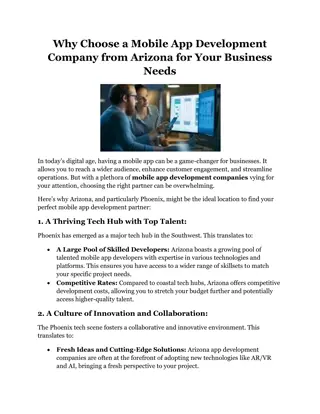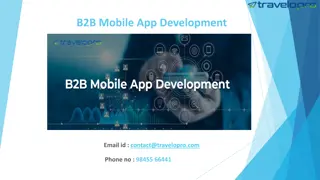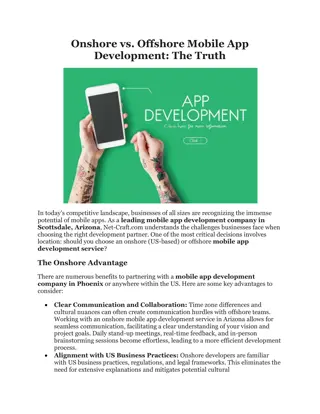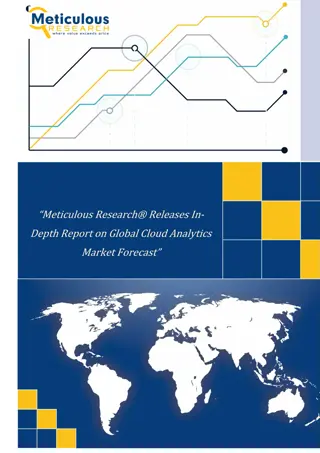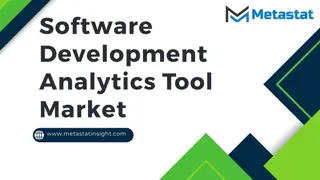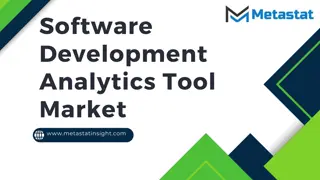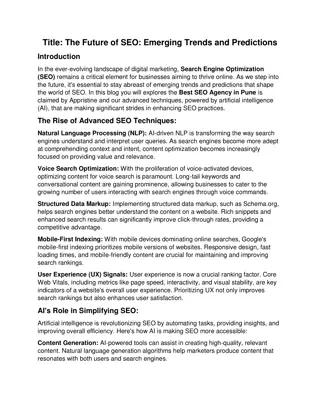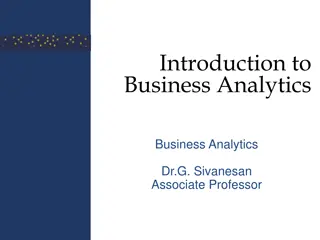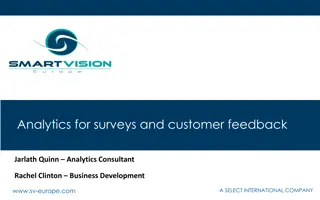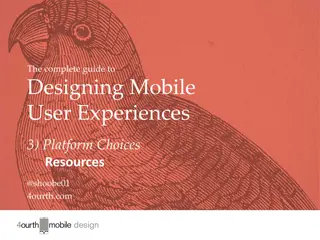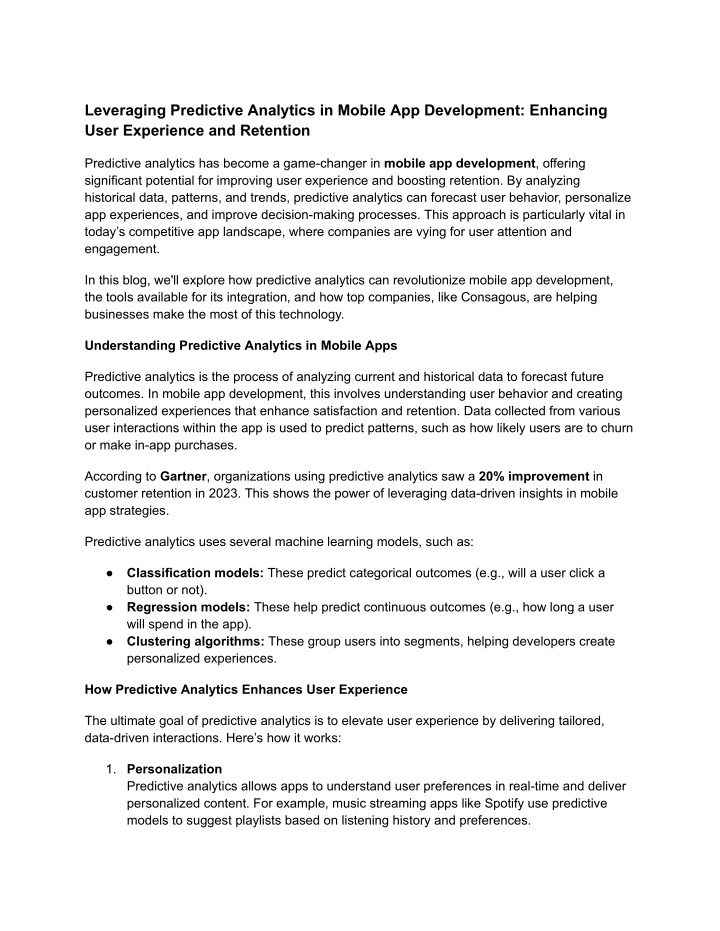
Leveraging Predictive Analytics in Mobile App Development_ Enhancing User Experience and Retention
Discover how predictive analytics is transforming the mobile app development landscape in our latest blog, How Predictive Analytics is Shaping the Future of Mobile App Development. By leveraging data and machine learning models, predictive analytics
Download Presentation

Please find below an Image/Link to download the presentation.
The content on the website is provided AS IS for your information and personal use only. It may not be sold, licensed, or shared on other websites without obtaining consent from the author. If you encounter any issues during the download, it is possible that the publisher has removed the file from their server.
You are allowed to download the files provided on this website for personal or commercial use, subject to the condition that they are used lawfully. All files are the property of their respective owners.
The content on the website is provided AS IS for your information and personal use only. It may not be sold, licensed, or shared on other websites without obtaining consent from the author.
E N D
Presentation Transcript
Leveraging Predictive Analytics in Mobile App Development: Enhancing User Experience and Retention Predictive analytics has become a game-changer in mobile app development, offering significant potential for improving user experience and boosting retention. By analyzing historical data, patterns, and trends, predictive analytics can forecast user behavior, personalize app experiences, and improve decision-making processes. This approach is particularly vital in today s competitive app landscape, where companies are vying for user attention and engagement. In this blog, we'll explore how predictive analytics can revolutionize mobile app development, the tools available for its integration, and how top companies, like Consagous, are helping businesses make the most of this technology. Understanding Predictive Analytics in Mobile Apps Predictive analytics is the process of analyzing current and historical data to forecast future outcomes. In mobile app development, this involves understanding user behavior and creating personalized experiences that enhance satisfaction and retention. Data collected from various user interactions within the app is used to predict patterns, such as how likely users are to churn or make in-app purchases. According to Gartner, organizations using predictive analytics saw a 20% improvement in customer retention in 2023. This shows the power of leveraging data-driven insights in mobile app strategies. Predictive analytics uses several machine learning models, such as: Classification models: These predict categorical outcomes (e.g., will a user click a button or not). Regression models: These help predict continuous outcomes (e.g., how long a user will spend in the app). Clustering algorithms: These group users into segments, helping developers create personalized experiences. How Predictive Analytics Enhances User Experience The ultimate goal of predictive analytics is to elevate user experience by delivering tailored, data-driven interactions. Here s how it works: 1. Personalization Predictive analytics allows apps to understand user preferences in real-time and deliver personalized content. For example, music streaming apps like Spotify use predictive models to suggest playlists based on listening history and preferences.
2. Anticipating User Needs By leveraging predictive analytics, apps can anticipate what the user might need next. Food delivery apps, for instance, can predict when a user might be hungry based on past ordering behavior and send a notification at the right moment. 3. Preventing Churn With the ability to predict when users are likely to disengage, apps can implement retention strategies. Mobile app development agencies in the USA are increasingly using these models to notify users or offer incentives just before they stop using the app. 4. Improving UI/UX Design Analyzing user data helps designers understand where users experience friction in the app. By predicting areas of frustration, designers can create smoother user flows that keep users engaged longer. Boosting Retention through Predictive Analytics User retention is a critical factor for the success of any mobile app. Studies show that a 5% increase in retention can result in a 25-95% increase in profits, according to Bain & Company. Predictive analytics can be a powerful tool for improving retention by offering insights into user behavior and engagement patterns. 1. Targeted Notifications Predictive models can determine the best time to send notifications, ensuring users receive them when they re most likely to engage. Push notifications powered by predictive analytics can be personalized and timed to perfection, leading to higher engagement rates. 2. Behavioral Segmentation Using predictive analytics, app developers can segment users based on their behavior patterns. For instance, they can identify users who are likely to make in-app purchases and target them with special offers, while offering different incentives to those at risk of churning. 3. Predictive Maintenance Predictive analytics can identify potential bugs or issues in the app before they affect the user. This proactive approach ensures a seamless user experience, reducing the chances of frustration and disengagement. 4. Content Optimization Apps using predictive analytics can optimize content based on what users are most likely to engage with. Social media platforms, for example, use these models to curate feeds and ensure users see content that keeps them scrolling. Tools for Integrating Predictive Analytics in Mobile Apps To integrate predictive analytics into mobile apps, developers need to use a combination of data collection tools, machine learning algorithms, and analytics platforms. Here are some popular tools:
1. Google Analytics Google Analytics offers robust features for tracking user behavior and engagement. By combining this data with machine learning models, developers can gain insights into user patterns and predict future behavior. 2. Firebase Predictions Firebase Predictions uses machine learning to create dynamic user segments based on predicted behavior. This tool is invaluable for developers looking to improve app engagement and retention by targeting users with relevant content. 3. Mixpanel Mixpanel is a powerful analytics platform that allows developers to track user interactions within an app and predict future actions. By using Mixpanel s predictive features, developers can identify users likely to convert, churn, or take other valuable actions. 4. Amazon Machine Learning (AWS ML) AWS ML offers pre-built algorithms that can be easily integrated into apps to enable predictive analytics. It s particularly useful for mobile app development companies in the USA looking to scale their apps while maintaining personalized user experiences. 5. BigML BigML provides an easy-to-use interface for building machine learning models, which can then be applied to app data for predictive analytics. This tool is ideal for startups or smaller app development teams looking to experiment with machine learning. Case Study: How Predictive Analytics Transformed a Fitness App A leading fitness app development company integrated predictive analytics to enhance user engagement. By analyzing user workout habits, the app was able to predict when users were most likely to skip workouts and send targeted reminders at the right time. This approach led to a 15% increase in user retention over six months. Additionally, the app used predictive analytics to recommend personalized workout plans based on the user s past performance, further improving the user experience. This kind of tailored approach is becoming increasingly common in healthcare and fitness apps. Predictive Analytics and Consagous Technologies At Consagous Technologies, a premier mobile app development company in the United States, we specialize in integrating advanced technologies like predictive analytics into mobile applications. Whether you re looking to enhance user experience, boost engagement, or improve retention rates, our expert team can help you leverage predictive analytics to its full potential. Our services cater to a wide range of industries, including healthcare, fitness, and retail, ensuring that every app we develop is powered by data-driven insights. As a leading Android development company in the USA, we are well-versed in incorporating predictive analytics into both Android and iOS platforms, delivering seamless experiences that resonate with users.
Conclusion: The Future of Predictive Analytics in Mobile Apps The integration of predictive analytics in mobile app development is no longer optional; it s a necessity for businesses looking to stay competitive. By understanding user behavior and anticipating their needs, apps can create experiences that not only delight users but also keep them coming back for more. Whether you re a startup or an established business, working with a top mobile app development agency in the USA, like Consagous, can help you harness the power of predictive analytics to transform your mobile strategy. From targeted notifications to personalized content, predictive analytics opens the door to endless possibilities for improving user experience and boosting retention. By incorporating the latest tools and techniques, Consagous helps businesses stay ahead of the curve, ensuring their mobile apps are not just functional but truly engaging. As the mobile app landscape continues to evolve, predictive analytics will remain a key driver of success. Ready to take your mobile app to the next level? Contact us today, and let s get started!








